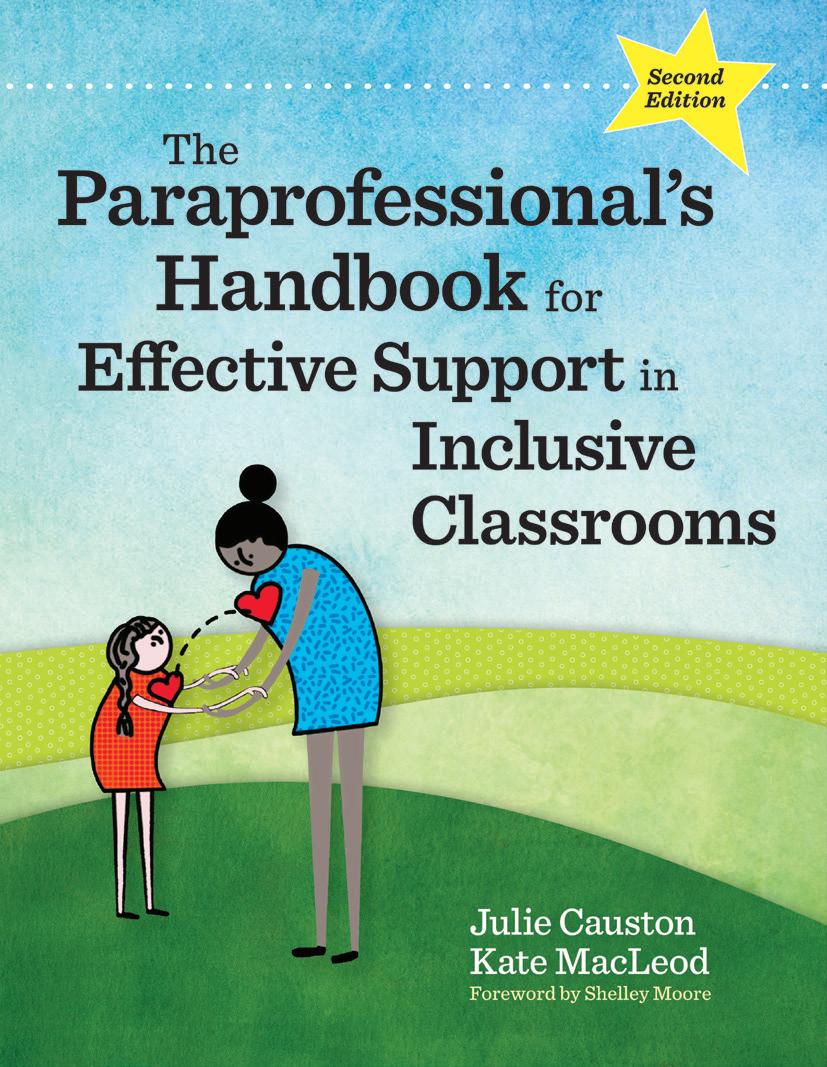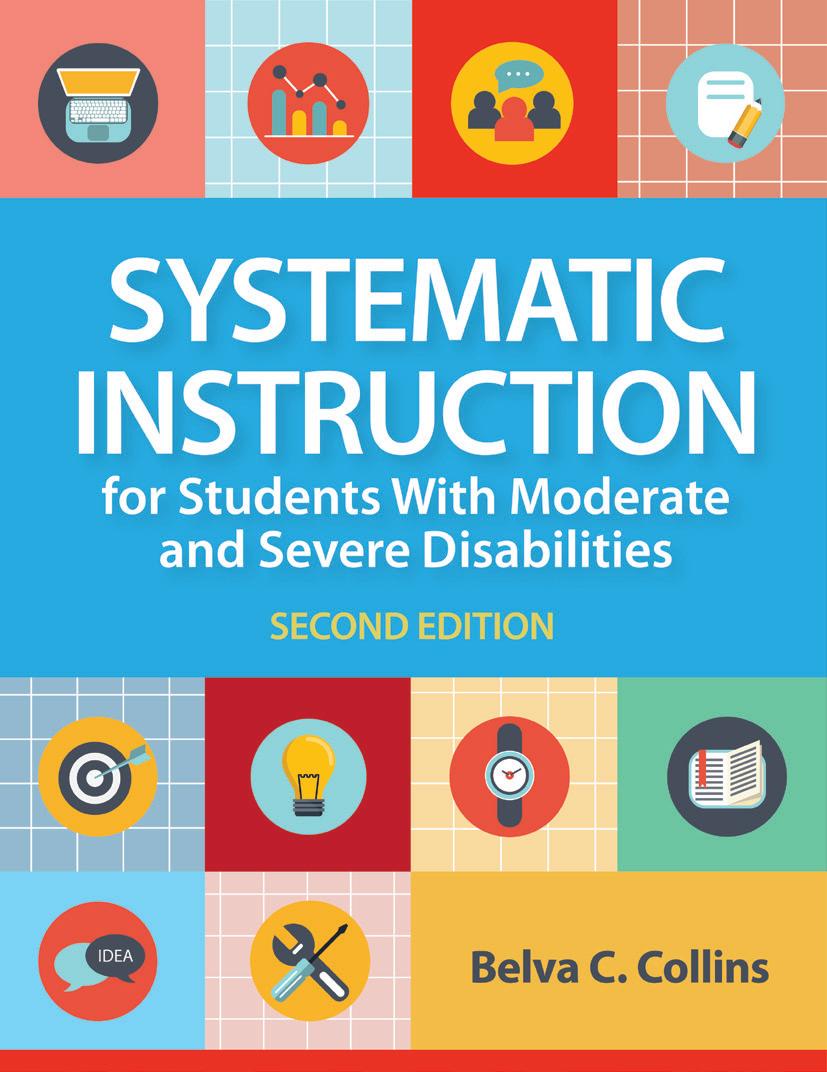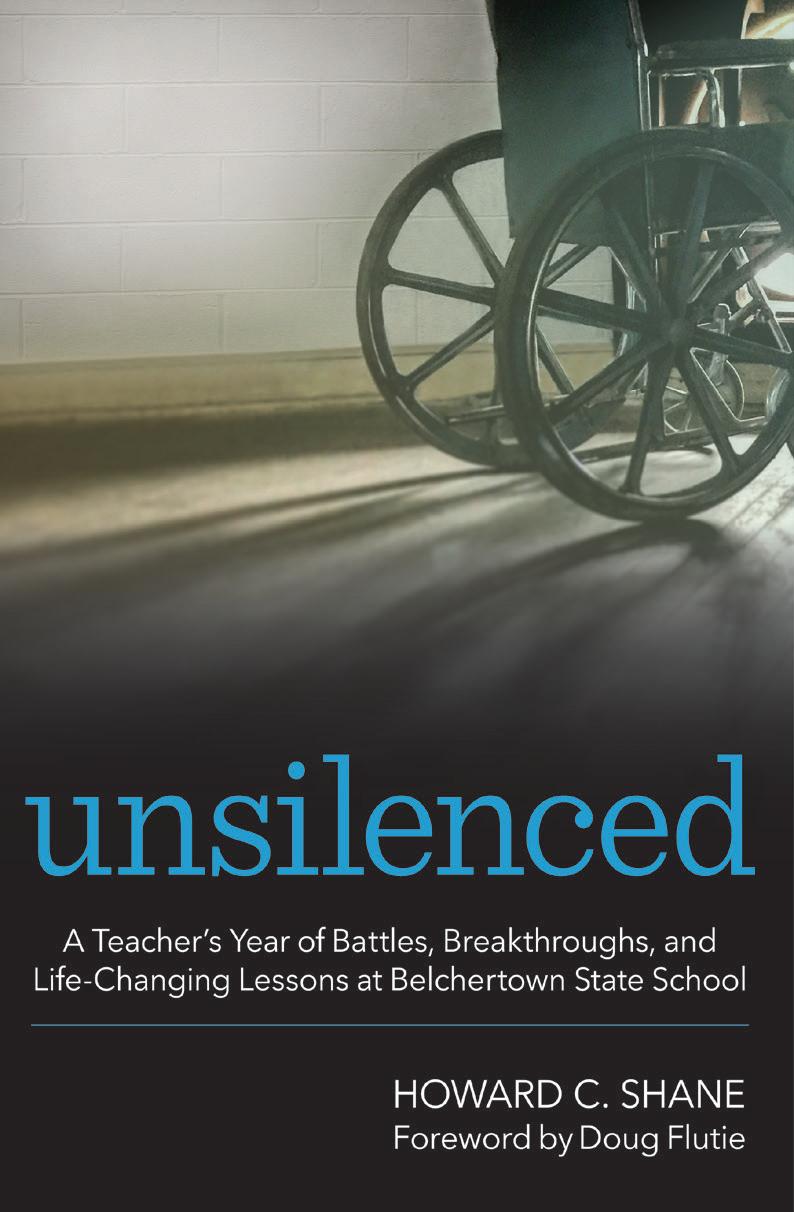
6 minute read
Supporting All Students Through Multitiered Instruction

ORDER EXAM COPY

CONTENTS
1. The Paraprofessional 2. Inclusive Education 3. Special Education 4. Collaborating with Others 5. Rethinking Your Students: Presuming Competence 6. Providing Academic Supports 7. Providing Social Supports 8. Providing Behavioral Support 9. Respectful Support for Developing
Student Independence 10. Supporting Yourself

The Paraprofessional’s Handbook for Effective Support in Inclusive Classrooms
Second Edition
By Julie Causton, Ph.D. (founder and CEO of Inclusive Schooling, formerly of Syracuse University), & Kate MacLeod, Ph.D. (University of Maine at Farmington, founder and consultant at Inclusive Schooling)
—Michael Giangreco, Ph.D., University of Vermont, Center on Disability & Community Inclusion
What does a great paraprofessional need to know and do? Your students will find real-world answers from two experts in the second edition of this bestselling guidebook. Passionate inclusion advocates Julie Causton and Kate MacLeod bring future praprofessionals a supremely practical guide to surviving and thriving as an integral part of a school’s inclusive team.
Your students will get immediately applicable strategies for mastering every facet of their complex role: collaborating with other team members, selecting accommodations and modifications, facilitating peer connections, fading their support, and much more. And they’ll have a treasure trove of tools—including activities, learning checks, reproducible templates, FAQs, and short to-do lists—to help them reflect on their practice and strengthen their daily work once they’re on the job.
An essential-hands-on guide for tomorrow’s paraprofessionals, this empowering book takes the guesswork out of this critical classroom role and prepares future professionals to help students with disabilities reach their full potential.
WHAT’S NEW: • New chapter on Respectful Support for Developing Student
Independence • More on key topics such as collaboration, presuming competence, and supporting social and academic success for students with diverse abilities • New and updated research, practices, digital tools, resources, examples, quiz questions, and reflection activities throughout the book • Package of online materials, including printable activities, forms, and worksheets




NEW
Second Edition
By Belva C. Collins, Ed.D. (Professor Emeritus, University of North Carolina at Charlotte and University of Kentucky)
To improve outcomes for students with moderate and severe disabilities, future K–12 educators need to understand the why and how of good instructional practices. They’ll find comprehensive guidance in the second edition of this bestselling text on systematic instruction, a highly effective teaching approach rooted in applied behavior analysis (ABA).
Fully revised and updated with timely topics and new sample lesson plans, this reader-friendly textbook prepares teachers to use dynamic, adaptable systematic instruction strategies to teach core content that is age-appropriate, meaningful, and relevant to students’ lives. Tomorrow’s teachers will discover evidence-based methods that help them with every step of systematic instruction, from collecting accurate screening and baseline data to supporting students as they generalize new skills to other settings. And faculty members will get a complete package of online instructor materials they can use in their courses, including test banks, PowerPoint slides, flowcharts for instructional procedures, and blank data sheets.
WHAT’S NEW • Revised and updated chapters throughout, with a wealth of practical strategies • A full package of online faculty materials • 14 new sample lesson plans, including learning objectives, instructional contexts, materials needed, teaching procedures, data collection and maintenance guidelines, and lesson extensions and variations • Insightful commentary from special educators in each chapter • More on working with parents and caregivers • Guidance in each chapter about adapting systematic instruction methods for distance learning • New chapter on making instructional decisions and exercising leadership • Explicit guidance on combining functional core content with standards-based instruction • More on inclusion and culturally responsive practices • Up-to-date research on systematic instruction
ORDER EXAM COPY
CONTENTS
1. Using Systematic Instruction When Teaching
Standards in Inclusive Classrooms 2. Using Technology with Systematic Instruction 3. Involving Others in Implementing Systematic
Instruction 4. Developing Data Sheets and Collecting Baseline
Data 5. Using Effective Practices to Teach Learners with
Moderate and Severe Disabilities 6. Applying the Principles of ABA to Teach Learners with Moderate and Severe Disabilities 7. Using Response Prompting Strategies: Graduated
Guidance, Most-to-Least Prompting, and System of
Least Prompts 8. Using Response Prompting Strategies: Time Delay and Simultaneous Prompting Procedures 9. Increasing the Efficiency of Instruction 10. Facilitating Maintenance and Generalization 11. Making Instructional Decisions and Exercising
Leadership


ORDER EXAM COPY

“The 1970s brought about change in the way American society treated human beings who were viewed as ‘deficient’ because of the difference in their physical or intellectual abilities . . . in his storytelling, [Shane] allows us to remember the people who endured those experiences. When educators think inclusion in schools is not important, they need to read this book to understand WHY it is a must. ”

—Carol Quirk, Ed.D., Chief Executive Officer, Maryland Coalition for Inclusive Education, Inc. (MCIE)
Unsilenced
COMING SOON A Teacher’s Year of Battles, Breakthroughs, and Life-Changing Lessons at Belchertown State School
By Howard C. Shane, Ph.D. (Boston Children’s Hospital, Harvard Medical School)
For future educators and other practitioners getting ready to work with people who have disabilities, learning the history of our attitudes and actions regarding disability is a vital part of professional preparation. That’s why this important and illuminating new book should be part of every recommended reading list for higher education courses on disability.
The year is 1969, and fresh-out-of-college smart-aleck Howard Shane has just landed his first teaching job—at Belchertown State School, a bleak institution where people with disabilities endure endless days of silence, tedium, and neglect.
Howard is stunned by the conditions at Belchertown and the challenges of his new job, but as he gets to know his diverse, endearing, and intelligent students, he becomes consumed with a mission: to unlock their communication skills and help them reach their full potential. Pitting his youthful idealism and passion against the rigidity of a rulebound administrator, Howard battles his way to small joys and victories with his students—and, along the way, learns just as much as he teaches.
A stirring and spellbinding memoir from internationally renowned AAC expert Howard Shane (Boston Children’s Hospital, Harvard Medical School), Unsilenced is a candid look at a pivotal era in disability history and a deeply personal account of how all human beings can flourish when we care for each other and fight for change. Eye-opening and unforgettable, this book is essential supplementary reading for a wide range of future professionals as they prepare to work with children and adults with disabilities.
US$29.95 | Stock #: 55156 | November 2021 | approx. 264 pages + 8-page photo insert | paperback | ISBN 978-1-68125-515-6
ORDER YOUR EXAM COPY TODAY!
You can request exam/desk copies of up to two books that are relevant to your course needs. If you see a book in this catalog that you’re interested in previewing, please look it up on www.brookespublishing.com, click the Request Exam Copy button found on the book’s page, and complete the request form. (All requested information must be supplied before we can process your order.)








